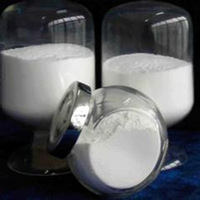描述
Product Description: Clarithromycin
Appearance: Clarithromycin is a white to off-white crystalline powder. It is odorless and has a slightly bitter taste.
Character: Clarithromycin is a semi-synthetic macrolide antibiotic that belongs to the subclass of azalides. It is derived from erythromycin and exhibits a broader spectrum of activity against various bacteria. Clarithromycin acts by inhibiting bacterial protein synthesis, thereby preventing the growth and replication of susceptible microorganisms.
Category: Clarithromycin is classified as an antibacterial agent and is widely used in the pharmaceutical industry for the treatment of various bacterial infections.
Chemical Formula: C38H69NO13
Molecular Formula: The molecular formula of clarithromycin is C38H69NO13, with a molecular weight of 747.95 g/mol.
As an antibacterial agent, clarithromycin works by inhibiting bacterial protein synthesis. It binds to the 50S ribosomal subunit of the bacterial ribosome, preventing the formation of functional peptide chains necessary for bacterial growth and replication. This mechanism of action gives clarithromycin a broad spectrum of activity against a wide range of bacteria, including Streptococcus pneumoniae, Haemophilus influenzae, Moraxella catarrhalis, Mycoplasma pneumoniae, Legionella pneumophila, and Helicobacter pylori.
Clarithromycin is commonly prescribed for the treatment of respiratory tract infections, such as community-acquired pneumonia, acute bacterial exacerbations of chronic bronchitis, and sinusitis. It is also effective against skin and soft tissue infections, including cellulitis and impetigo. Additionally, clarithromycin is used in the treatment of certain sexually transmitted infections, such as chlamydia and gonorrhea.
In the pharmaceutical industry, clarithromycin is manufactured under strict quality control measures to ensure purity, potency, and safety. The production process involves the synthesis of clarithromycin from erythromycin, followed by purification and formulation into various dosage forms.
Clarithromycin is generally well-tolerated, with common side effects including gastrointestinal disturbances, such as nausea, vomiting, diarrhea, and abdominal pain. Rare but serious side effects may include allergic reactions, liver dysfunction, and cardiac arrhythmias. It is important to consult a healthcare professional if any adverse reactions occur during treatment.
In conclusion, clarithromycin is a highly effective antibiotic used in the treatment of various bacterial infections. Its broad spectrum of activity, convenient dosing options, and well-established safety profile make it a valuable tool in the pharmaceutical industry for combating bacterial infections and improving patient outcomes.
